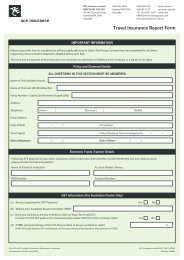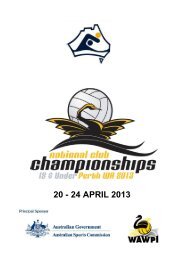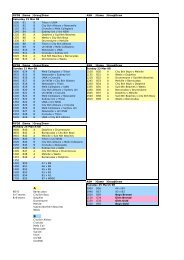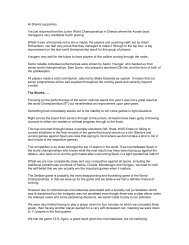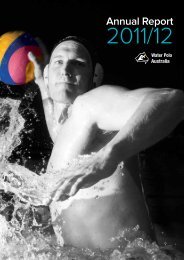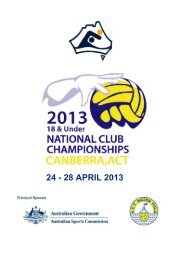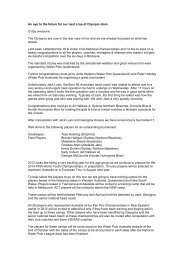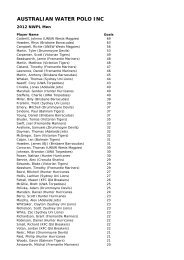2009-10 Annual Report - Australian Water Polo Inc
2009-10 Annual Report - Australian Water Polo Inc
2009-10 Annual Report - Australian Water Polo Inc
You also want an ePaper? Increase the reach of your titles
YUMPU automatically turns print PDFs into web optimized ePapers that Google loves.
team properly as we had done in previous years.<br />
A lead-up tournament, Germany training camp and<br />
the Unicum Cup in Hungary comprised the first tour.<br />
With the absence of many of the senior players in<br />
Belgrade for the World University Games (WUG), the<br />
senior squad selected to represent Australia at the<br />
German common training camp and the Unicum Cup<br />
in Hungary comprised a mixture of senior international<br />
players, who were not eligible for WUG, and a host of<br />
promising juniors.<br />
Unfortunately, due to the late withdrawals of two<br />
players — Daniel Lawrence (work commitments) and<br />
Pietro Figlioi (defection to Italy) — we were left with a<br />
touring party of 11 to contest training and play two friendly<br />
internationals in Germany. We were then later joined by<br />
returning international player Sean Boyd, who agreed<br />
to come out of international retirement since 2001, and<br />
Tim Cleland, who was delayed with work commitments.<br />
This meant the squad was bolstered to 13 players for the<br />
Unicum Cup.<br />
The team had only three returning Olympians from<br />
2008, and a number of debutant senior touring players.<br />
Given the lack of experience and numbers of players<br />
early on in the tour, it was to be expected that we would<br />
face difficult situations against a German team that had<br />
11 of 13 Beijing Olympians still in the squad. Germany<br />
also had the luxury of up to <strong>10</strong> players trying out for the<br />
remaining spots on the world championship roster, so<br />
the workload was extremely high for our players.<br />
Nevertheless, the training was invaluable and the<br />
results of the games were reasonable, with both only<br />
being decided in the second half after scores were close<br />
at halftime. Final results: Germany won 17-<strong>10</strong> and 12-<br />
6.<br />
At the Unicum Cup in Budapest, we lost to Germany<br />
9-6, Hungary <strong>10</strong>-7 and Serbia 12-6.<br />
FINA World Championships, Rome<br />
This edition of the world championships was always<br />
going to be difficult due to the number of players who<br />
retired following the Beijing Olympics.<br />
The team had seven players (more than half the<br />
team) missing from the 2008 Olympic team.<br />
Basically this left the team without an established<br />
international centre forward, few options with a back-up<br />
centre forward, no established left-handed players and<br />
the loss of our main attacking player and arguably one of<br />
best shots in the world in Figlioli.<br />
In total, the loss of these players amounted to more<br />
than 1500 international games of experience.<br />
Another influencing factor was that the world<br />
championships team did not assemble until only one<br />
week before the start of the tournament. A conscious<br />
decision was made to send our best possible team to<br />
the World University Games, in the hope of snaring a<br />
good result and build a platform for the future in terms<br />
of gaining recognition and prestige in a recognised<br />
international event.<br />
Other mitigating reasons that influenced the decision<br />
to target the WUG to the possible detriment of the world<br />
championships included:<br />
• The WUG has been regarded as an important<br />
competition for all European countries and the fact<br />
that they were being hosted in Serbia made these<br />
Games a head-line sport.<br />
• With the demise of the 20 & Under FINA World<br />
Championships, it gave many of our younger<br />
athletes in this age group and other developing<br />
senior players, an opportunity to perform on the<br />
world stage in a highly respectable competition.<br />
• The WUG is the only event on the water polo<br />
calendar besides the Olympic Games where the<br />
athletes and coaches have the opportunity to<br />
live, practise and perform in competition under<br />
the village atmosphere conditions. This speaks<br />
volumes about the relevance of this event in our<br />
planning towards the Olympic Games and the<br />
players’ ability to cope with the demands thrown<br />
up in living in a team-village situation.<br />
I don’t think there has been enough recognition given<br />
to the coaches and players on this fine achievement and<br />
how important it is in our ongoing player development.<br />
History shows that achievements in major sub-senior<br />
international competitions are the best indicators for<br />
future success of senior players and teams.<br />
Congratulations to Paul Oberman, who coached the<br />
team superbly; Jon Sieben, manager; and the players<br />
who achieved Australia senior men’s first gold medal in<br />
recognised senior international competition.<br />
Seven players who won gold at the WUG went on to<br />
represent Australia at the world championships.<br />
Due to our lack of quality centre forwards, the decision<br />
was made to call up a long-retired player to fill the void.<br />
Sean Boyd returned to international competition despite<br />
having a very limited training and preparatory period.<br />
This decision was made in the hope that Sean would not<br />
only play an important role in these championships, but<br />
also commit longer term to assist with filling the void of<br />
capable centre forwards at this level.<br />
We defeated Kazakhstan 14-7, sadly dropped 13-<br />
15



